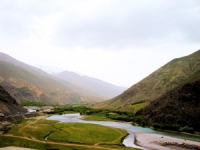Water sharing between Central Asian countries has been conflicting for quite a long time already.
Capacity Development

Afghanistan and the Central Asian countries have been undergoing changes: Afghanistan after three decades of war and unrest is in process of development; the Central Asian countries, since gaining independence in 1990s, were undergoing through constant agricultural, land, and other forms of reforms.
As a result of constant changes, the institutions become weakened to deal with changes. In addition, the capacities of these organizations are also fading with new emerging issues such as global climate change, tensions over transboundary water resources, international law applications, and other issues.
It is crucial to develop capacities in all the countries in the region for adaptation to changes and socio-economic development.
Currently, there is a considerable amount of young professionals who study or work in a foreign country. When the fellows return to their home countries, they find it more attractive to work in international organizations, due to lack of incentives and competitive environments in governmental institutions. This greatly reduces the capacities of these institutions.
Furthermore, the research capacity of local specialists could be advanced by incorporating new research methodologies such as multidisciplinary approaches to water management, as well as English language skills. Also, the gap between research and policy, where researchers lack the capacity to inform and influence the policymakers must be strengthened.
There is a strong need to bridge this gap by initiating collaborative research, mobility of young and mid- level researchers among Afghan, Central Asian and international researchers and experts. This collaboration will result in regional cooperation of the experts from different riparian countries.
In addition, the strategies to strengthen the capacities must include:
-
Capacity development in:
- Application of international agreements on water, climate, pollution
- Climate change studies and modeling
- Different leadership skills such as negotiation, argumentative skills
- Regional cooperation studies
- Strengthening research capacity
- Creation of incentives and creative environment where young professionals can realize their ambitions
- Exchange and mobility of young, mid- experts, professionals, and researchers from Afghanistan and other Central Asian countries
Thematic Policy Brief "Developing integrated water-management capacities and empowering local experts"









